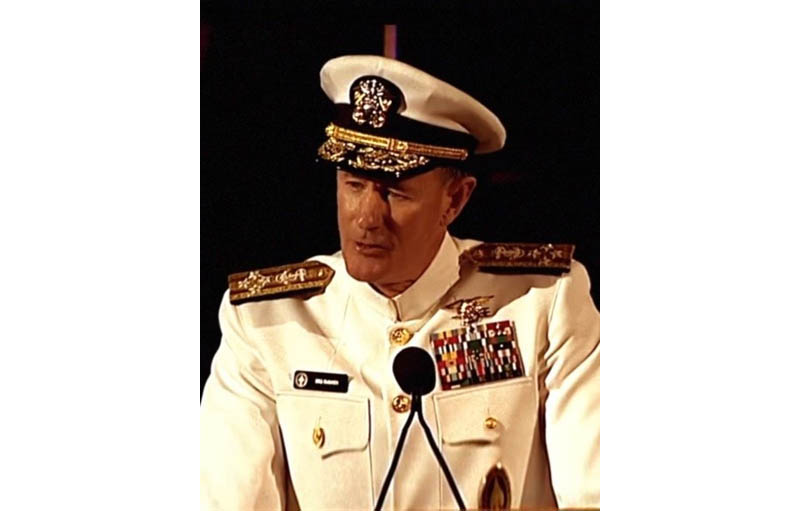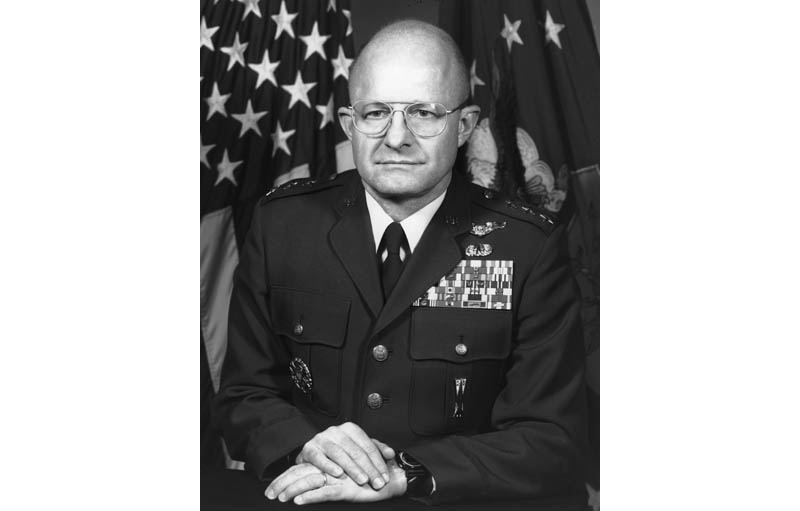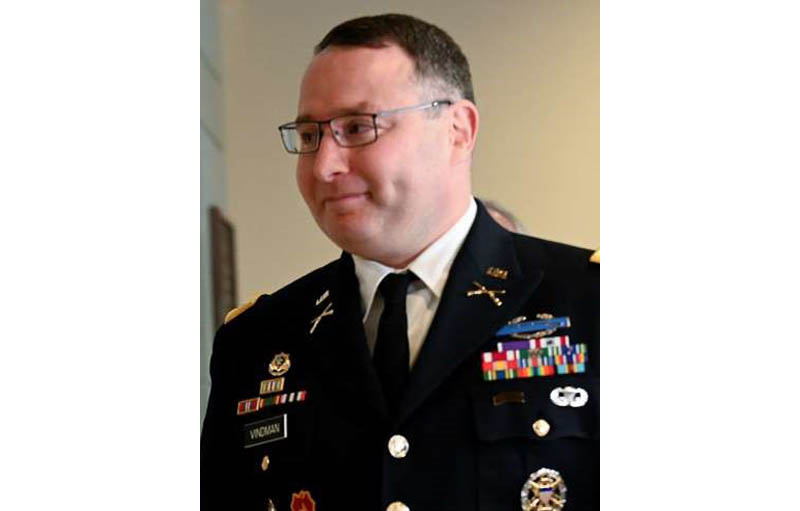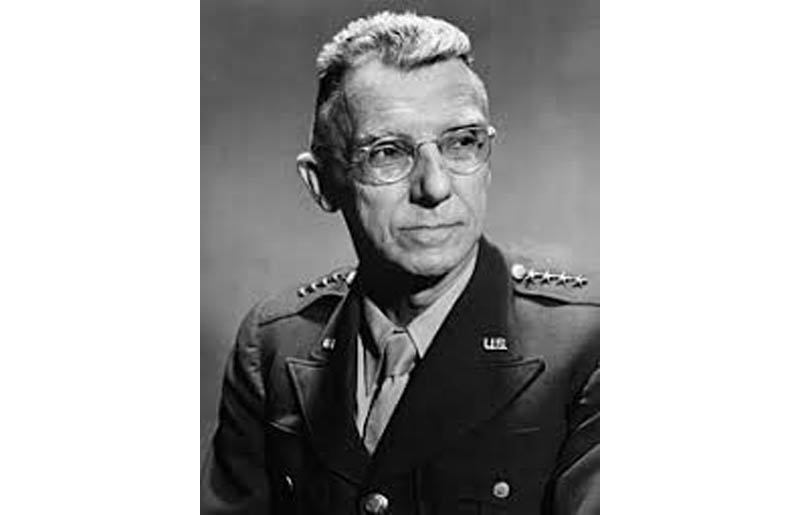A Partisan Pentagon
by G. Murphy Donovan (December 2019)

Reunión en el Pentágono, Oswaldo Guayasamín, 1970
There is no substitute for victory. —Douglas MacArthur
We like to think of military officers as political eunuchs, but that fairy tale, like free lunch, is a smug myth. No American government institutions, including the military services, thrive or survive in Washington without vigorous internal and external political engagement.
Occasionally, often incidentally, that vigor has something to do with national security. Early salutary precedents are few but significant.
George Washington began his political career as a British Lieutenant Colonel, rose to rebel army commander, then American president. He set the tone for American policy about term limits, citizen soldiers, and standing armies.
Read more in New English Review:
• Traversing the Landscape of Gender Politics, Pt.2
• Now is Not the Time
• Hypocrites and Heroes
During the Civil War, General George McClellan couldn’t separate logistical angst from offensive imperatives and Lincoln fired him for cause—timidity and insubordination. McClellan was a vicious, if not seditious, critic of White House war policies.
Lincoln, to his credit, was an excellent lawyer. He recognized the hazards of passive aggression in commanders. Alas, White House willingness to cashier timid or insolent generals didn’t survive the Truman era.
George McClellan, a Democrat, ran against Lincoln, a Republican, in the 1864 election. Lincoln thumped McClellan who ran, oddly enough, on a pro-slavery, pro-Union platform. Some things never change.
.jpg)
Between the great world wars, Billy Mitchell (above), US Air Corps, took on the defense establishment and a moribund US Navy on the merits of aviation. Mitchell was court martialed in 1925 and busted to colonel for his public prescience. Billy argued that bombers would make battleships obsolete. Pearl Harbor vindicated Billy, but we didn’t actually get a separate Air Force until 1948 and battle wagons survived well into the Vietnam era.
Douglas MacArthur might be the most infamous serving officer to fall on a policy sword. General MacArthur was a genuine military icon who was instrumental in the Pacific victory in WWII and early success in the Korean War. When the Chinese entered the Korean conflict in 1950, MacArthur and President Truman locked horns over nuclear weapons policy.
Apparently, Truman was reluctant to use atomic bombs against the Chinese as he had done to vanquish the Japanese. MacArthur was fired, like Mitchell, for insolent foresight.
The Korean stalemate abides to this day.
Such war stories are ripe with irony. Douglas MacArthur, as a two star, sat on the court martial board that convicted and cashiered Brigadier Billy Mitchell decades earlier.
Dwight Eisenhower is the other five star flag in our quintet of political precedents. Ike led the charge in Europe during WWII and went on to become the last professional soldier to become President. As Eisenhower left the political stage, he provided a prescient warning about a, then emerging, permanent “military industrial complex.”
Ike’s early warning proved to be prophetic in fact and deed.
Outspoken American military icons have several things in common. Each of the above, in his own way, was political, yet only one was partisan. Alas, lessons earned are seldom learned. Strategic wisdom is often ignored.
In short, being right is never the end of the fight.
Soldiers with integrity, vision, and conscience have one more thing in common. They honor the wall between political and partisan, the ethic that allows for a distinction between policy differences, honorable service, and sedition. To illustrate, consider for contrast, a suite of contemporary military officers whose behavior today is a toxic echo of McClellan’s ugly precedent, something other than “duty, honor, and country.”
James Mattis, Marine Corps
We begin with General James Mattis, former Secretary of Defense, because he is just the latest erstwhile flag officer to step on his crank. Known to his disciples as the patriarch of Paris Island or Krishna Quantico, Mattis had legitimate policy differences with President Trump. Unfortunately, the general’s behavior since resignation is nothing short of puerile.
.png)
After Mattis beat a petulant retreat from the Pentagon, Trump suggested that Mattis was “not a great general,” an admittedly insensitive recitation of the obvious.
Since the Vietnam fail, the Gulf War had to be fought twice. Iraq is still a hot mess. Syria has become another divided, surrogate killing field. After thirty years of American campaigning, Afghanistan is arguably worse off today than it was under Soviet occupation. Libya is still a smoldering Obama/Clinton era ruin. Now, North Africa has another Specified Command bureaucracy and another spasm of pyric small wars. And the global, so-called, “war on terror” might be the most expensive bad joke in the history of military inertia.
Adding insult to insanity, we now have a new Cold War with Russia. Much of this came to pass with Mattis and company at the helm in the Pentagon.
Rather than disputing Trump’s jibe with facts, Mattis chose the low road and attacked the President’s character, Trump’s lack of military service in Vietnam. “Mad Dog” is fond of referring to those who did not serve in Vietnam as “pussies.” General Mattis fails to mention that the vast majority of American cats do not choose to serve in the military now or then.
Ironically, Mattis’ pique validated Trump’s judgement. Seems the general can’t take a punch. No one will ever be able to say that about Trump.
Indeed, “service” in the Oval Office today, midst a vicious coup, requires more moxie than killing tribal Toyotas with drones, cruise missiles, tanks, gunships, and fighter planes in a world replete with inconclusive small wars and Third World sierra hotels.
Those who serve in the military, General Mattis, are not necessarily honorable, any more than those who do not serve are dishonorable. And not to put too fine a point on it, strategic competence is not all brass hats, fruit salad, and parade swords.
Another USMC pyrrhic warrior runs a close second to Mattis. Nikki Haley, former UN Ambassador, now reveals that John Kelly Jr. was attempting to “undermine” the President while he served as White House chief-of-staff. Unelected DOD mandarins, like their State Departments counterparts, have come to believe that the deep state is the real state.
William McRaven, US Navy
Admiral Bill McRaven, USN, might be Buffalo Bill Cody of the contemporary warrior class, a circus act trading on a reputation long after the shooting is done. This Bill is no Billy Mitchell.

After retirement, in August 2018, McRaven came out of the partisan closet in the Washington Post to defend embattled CIA director John Brennan and excoriate the President: “He (Brennan) is a man of unparalleled integrity, whose honesty and character have never been in question.” We now know that Brennan was at the center of the “dossier” plot, a scheme to cook the 2016 election, followed by special counsels, investigations, and coup machinations that dog the White House to this day.
McRaven, arguably a very partisan flag, now makes a career out of milking the bin Laden kill, one of very few team Obama tactical achievements in eight years. Targeted assassinations, however, of al Qaeda or ISIS principals, like the recent al Baghdadi kill, do little to change the pathology of Syria, Afghanistan, Iraq, Iran, Libya, or Muslim small wars around the globe.
Special operations, drone strikes, and cruise missiles may make headlines, but they do little to change the culture of Islamism in the east or the erosion of freedom in the west.
Since 1948, the occasional tactical win has not altered the vector of strategic jihad success.
James Clapper, USAF
All of what is corrupt and partisan among military mandarins might be found in the person and recent career of General James Clapper. Former Director of National Intelligence, Clapper, now at CNN, is being rolled up, along with James Comey (FBI), John Brennan (CIA), and Hillary Clinton in several federal inquiries. In fairness, Clapper, a technician, was probably just a “useful idiot” in the dirty dossier scam. It was John Brennan at CIA who insisted on carrying the fabricated smut on Trump to media haters and Democrats in Congress.

All of the unindicted co-conspirators in the 2016 election meddling and the subsequent coup shenanigans now work for left leaning broadcast networks. How convenient.
It’s a safe bet that the Clapper cabal didn’t go over to the dark side just when Trump came to town. President Trump’s great contribution to national security is to oppose and expose longstanding bias, corruption, and partisanship in the Intelligence Community, the Department of Justice, State Department, and now the Pentagon.
Clapper’s great fail, however, with an assist from Obama and CIA’s John Brennan, was to shade Intelligence to accommodate national security fictions. The threat pyramid was inverted on Clapper’s watch. Islam was advertised as a “great” culture whilst Russians were demonized. According to acolytes like Brennan, the jihad is just “ritual cleansing.” By that logic, all that slaughter on 9/11 and every other global Muslim atrocity are just “ritual” sacrifices to whom or what—Mohamed or Mecca?
Political theology matters to Islamists and the jihad. The fusion of politics and religion should matter to American Intelligence analysis too. Islamism is the “clash of civilizations.” American Intelligence has surrendered the strategic moral high ground to Islamic zealots and politically correct Intelligence analysis. General Clapper, USAF, owns that strategic fail; the misrepresentation of Muslim cultural supremacists and all their apologetics for the dark side of jihad.
We shouldn’t leave the USAF without fingering Michael Hayden (below), aka Elmer Fudd; now employed, like Clapper, as a CNN “news analyst.” General Hayden, former director of both NSA and CIA, was at the helm at NSA during 9/11, the worst Intelligence warning failure in American history. Subsequently, Hayden became the first Military Intelligence officer to reach four star rank.
.jpg)
Parenthetically, given what we now know about the comprehensive intrusiveness of NSA surveillance, it’s a wonder that the FBI or Congress never supoenaed Clapper or Hayden to produce Hilary Clinton’s 30,000 missing emails.
Hayden is now a model for another contemporary and ambiguous military ethic. With victory off the table, failure is an achievement.
Alexander Vindman, US Army
The US Army might occupy a high ground for dysfunctional flag officers. Clinkers like David Petraeus or Stanley McChrystal immediately come to mind. Petraeus literally stepped on his crank by bedding subordinates. McChrystal got caught on a party plane talking trash about the timidity of Barack Obama.
If you audited US Army flag misbehavior, a wandering willie seems to be the favorite misdemeanor. By today’s standards, keeping your pants outside the officer’s club seems to be a bigger challenge than winning a small war or defeating Islamist psychopaths.
The peccadillos of today’s Army generals are, nevertheless, low hanging fruit. More ominous, Army political partisanship is bleeding into the ranks. The poster child for this kind of venality is an NSC Lieutenant Colonel, Alexander Vindman. Yes, that’s the National Security Council at the White House. Seems Vindman is an arrogant linguist who is both indiscrete and treacherous.

Vindman didn’t like, or misconstrued, something President Trump said to the Ukrainian president. Subsequently, Alex went off the reservation to assist the press and Congress with the impeachment follies.
Apparently a commissioned US Army officer cannot be trusted to assist the Commander-in-Chief and respect the confidentiality of the Oval Office. If Vindman had violated command confidentiality in a combat zone, he might have been court martialed—or fragged.
Silence from the Pentagon brass about the Vindman treachery says all that needs to be said about contemporary military standards on the E-Ring.
And so it goes with Beltway bias. Now, DOD joins the Intelligence Community, the Justice Department, and State Department as a source of foot soldiers for the slow motion coup.
Call it the sedition coalition.
Read more in New English Review:
• Failing to Confront Iran
• Not Always Man’s Best Friend
• Lost and Found: Rediscovering Christian Truth
Say what you will about Donald Trump: this President has exposed the reality of the Washington swamp, the partisan deep state, and a bigoted Beltway establishment that may now be too corrupt for words.
Epilogue
A tired metaphor suggests a “picture is worth a thousand words.”
Compare, if you will, photos of today’s general officers with any photo of General “Vinegar Joe” Stillwell, hero of the WWII China/Burma Theater. Stillwell walked across Burma with his troops. Not because he had to, Joe Stillwell simply chose to suffer the same hardships as his men. Stillwell seldom wore rank in the field, either. He didn’t need to.
Even behind the lines, in a Class A uniform, the humble and aesthetic Stillwell wore just a couple of U.S. lapel pins and the insignia of his rank. Great leaders set great examples.

If you audited the blouse of the average pudgy Army officer today, Vindman for example, you might find fifty or more bells, whistles, badges, ribbons and assorted gewgaws. If the truth be told, most of the fruit salad on officer tunics in Washington is for attendance or “being there,” not merit or achievement. There’s even a gaudy badge today, the size of a silver dollar, to signify a tour at the Pentagon. Hazardous duty indeed.
Would that just one ingredient in all that chest salad signified victory.
Alas, even with true military heroes, mostly enlisted men, it’s always cheaper to give them a ribbon or a pot metal badge rather than a raise or promotion.
«Previous Article Table of Contents Next Article»
__________________________________
G. Murphy Donovan is a former USAF Intelligence officer, Vietnam veteran, a graduate of Iona College (BA), the University of Southern California (MS), the Defense Intelligence College, and the Air War College. He is a former Senior USAF Research Fellow at RAND Corporation, Santa Monica and the former Director of Research and Russian (nee Soviet) Studies, ACS Intelligence, HQ USAF, serving under General James Clapper. Colonel Donovan has served at the Defense Intelligence Agency, the National Security Agency and the Central intelligence Agency. He is a decorated Vietnam veteran who keeps his fruit salad in his sock drawer, where it belongs.
Follow NER on Twitter @NERIconoclast